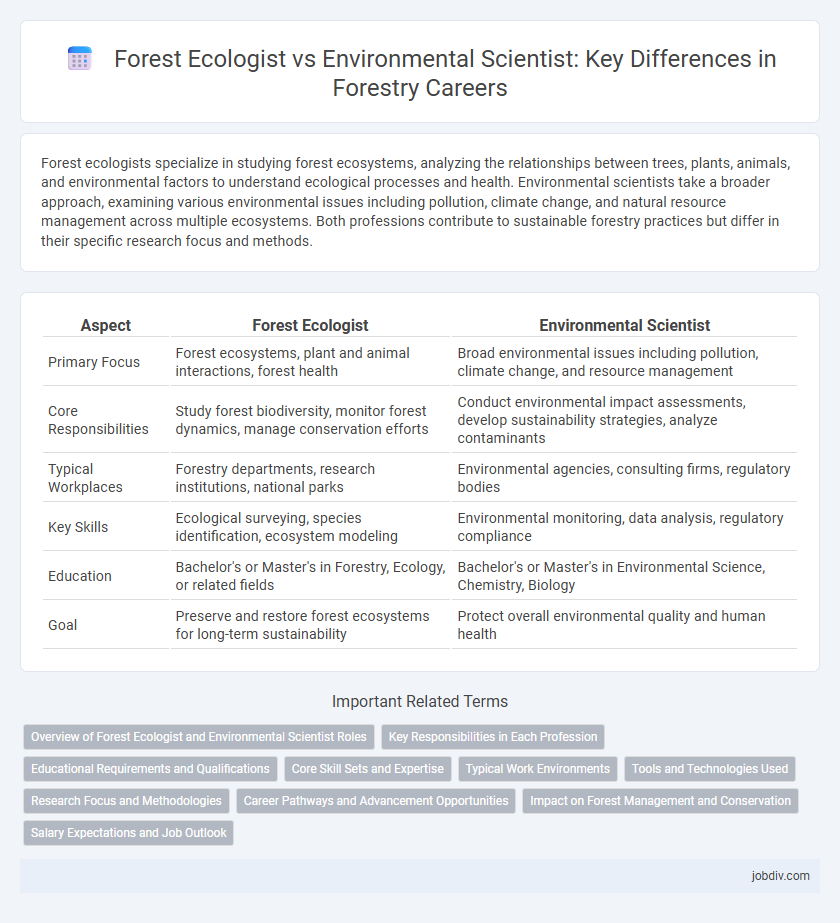Forest ecologists specialize in studying forest ecosystems, analyzing the relationships between trees, plants, animals, and environmental factors to understand ecological processes and health. Environmental scientists take a broader approach, examining various environmental issues including pollution, climate change, and natural resource management across multiple ecosystems. Both professions contribute to sustainable forestry practices but differ in their specific research focus and methods.
Table of Comparison
| Aspect | Forest Ecologist | Environmental Scientist |
|---|---|---|
| Primary Focus | Forest ecosystems, plant and animal interactions, forest health | Broad environmental issues including pollution, climate change, and resource management |
| Core Responsibilities | Study forest biodiversity, monitor forest dynamics, manage conservation efforts | Conduct environmental impact assessments, develop sustainability strategies, analyze contaminants |
| Typical Workplaces | Forestry departments, research institutions, national parks | Environmental agencies, consulting firms, regulatory bodies |
| Key Skills | Ecological surveying, species identification, ecosystem modeling | Environmental monitoring, data analysis, regulatory compliance |
| Education | Bachelor's or Master's in Forestry, Ecology, or related fields | Bachelor's or Master's in Environmental Science, Chemistry, Biology |
| Goal | Preserve and restore forest ecosystems for long-term sustainability | Protect overall environmental quality and human health |
Overview of Forest Ecologist and Environmental Scientist Roles
Forest ecologists study the relationships between forest ecosystems and living organisms, focusing on biodiversity, forest health, and ecological processes. Environmental scientists analyze environmental data to address pollution, conservation, and natural resource management, often applying broader environmental policies. Both roles require expertise in ecology and environmental science but differ in their emphasis on forest-specific versus general environmental issues.
Key Responsibilities in Each Profession
Forest ecologists focus on studying forest ecosystems, analyzing plant-soil interactions, biodiversity, and the impacts of climate change on woodland habitats. Environmental scientists assess pollution levels, monitor environmental health, and develop strategies to mitigate human impacts on natural resources, including air, water, and soil quality. Both professions collaborate to promote sustainable forest management and conservation efforts through scientific research and environmental policy development.
Educational Requirements and Qualifications
Forest ecologists typically require a bachelor's or master's degree in forestry, ecology, or environmental science, with specialized coursework in forest ecosystems and biodiversity. Environmental scientists often hold degrees in environmental science, biology, chemistry, or related fields, emphasizing broader environmental systems and impact assessments. Professional certifications such as Certified Forester (CF) for forest ecologists and Environmental Professional (EP) credentials for environmental scientists enhance qualifications and career prospects.
Core Skill Sets and Expertise
Forest ecologists specialize in understanding the interactions between trees, wildlife, and ecosystems, utilizing skills in dendrology, soil science, and habitat assessment. Environmental scientists possess a broader expertise in pollution control, environmental policy, and chemistry, focusing on assessing and mitigating environmental impacts. Both professions require strong data analysis and field research capabilities, but forest ecologists concentrate on forest-specific biodiversity and ecosystem dynamics while environmental scientists address diverse environmental challenges across multiple habitats.
Typical Work Environments
Forest ecologists typically conduct research in forested areas, including national parks, nature reserves, and timberlands, where they analyze plant and animal interactions within ecosystems. Environmental scientists often work in a broader range of settings, such as government agencies, laboratories, and urban environments, focusing on pollution control, resource management, and environmental policy. Both professions may also spend time in office environments to interpret data and prepare reports, but their fieldwork locations vary based on specific ecological or environmental objectives.
Tools and Technologies Used
Forest ecologists predominantly use geographic information systems (GIS), remote sensing technology, and dendrochronology tools to analyze forest composition, growth patterns, and ecosystem health. Environmental scientists also employ GIS and remote sensing but integrate broader environmental monitoring equipment such as air and water quality sensors, soil sampling kits, and pollution detection devices to assess ecosystem impacts. Both professions utilize statistical software and modeling platforms to interpret data and predict environmental changes, with forest ecologists focusing specifically on forest dynamics.
Research Focus and Methodologies
Forest ecologists specialize in studying forest ecosystems, analyzing interactions among trees, plants, animals, and environmental factors using field surveys, remote sensing, and ecological modeling. Environmental scientists have a broader research focus, investigating pollution, climate change, and human impact on natural resources through laboratory analysis, geographic information systems (GIS), and environmental impact assessments. Both disciplines employ scientific methods, but forest ecologists emphasize ecosystem dynamics specific to forests while environmental scientists address broader environmental challenges.
Career Pathways and Advancement Opportunities
Forest ecologists typically specialize in ecosystem management, conservation, and habitat restoration, pursuing career pathways in research institutions, government agencies, and forestry management organizations with opportunities to advance into senior ecological analyst or forest management roles. Environmental scientists, with broader training in environmental policy, chemistry, and biology, often find career growth in environmental consulting firms, regulatory bodies, and sustainability departments, advancing toward environmental project manager or policy advisor positions. Both professions offer pathways to leadership roles, but forest ecologists tend to advance through specialized ecological expertise, while environmental scientists leverage interdisciplinary knowledge for diverse environmental impact assessments and regulatory compliance.
Impact on Forest Management and Conservation
Forest ecologists analyze ecosystem dynamics, species interactions, and biodiversity within forest environments to guide sustainable forest management practices. Environmental scientists assess broader environmental factors such as pollution, climate change, and human impact, providing data crucial for conservation policy development and habitat restoration. Collaboration between these experts enhances forest conservation strategies by integrating ecological knowledge with environmental monitoring and regulatory frameworks.
Salary Expectations and Job Outlook
Forest ecologists typically earn salaries ranging from $50,000 to $80,000 annually, reflecting their specialized expertise in forest ecosystems and biodiversity conservation. Environmental scientists, with a broader focus on environmental impact assessments and policy, tend to have a salary range between $55,000 and $85,000, depending on industry and location. Job outlook for both professions remains positive, with the U.S. Bureau of Labor Statistics projecting about 8% growth for environmental scientists and similar demand for forest ecologists driven by increasing emphasis on sustainable forestry and climate change mitigation.
Forest Ecologist vs Environmental Scientist Infographic

 jobdiv.com
jobdiv.com